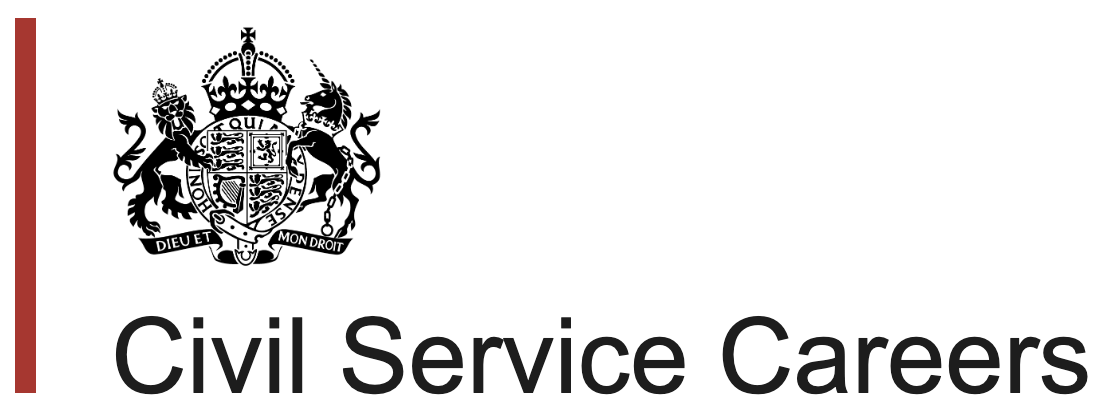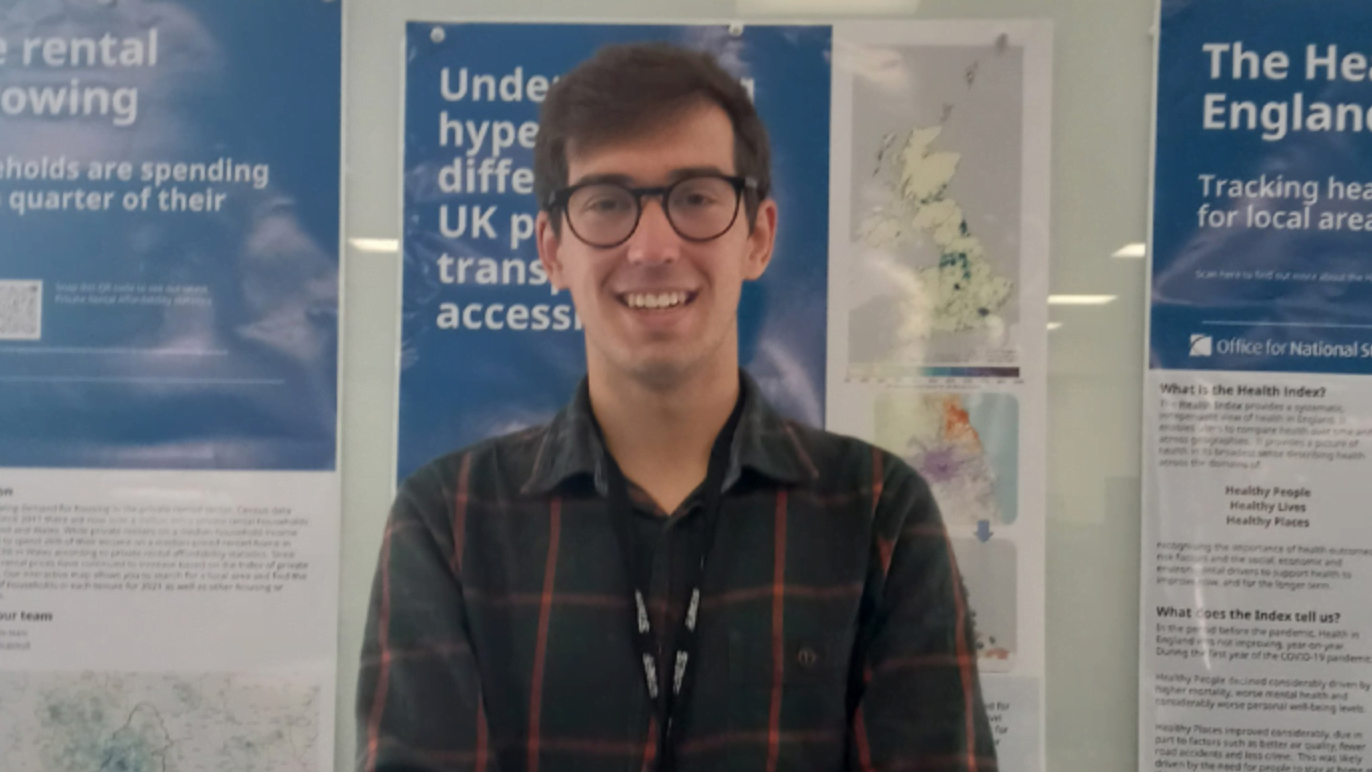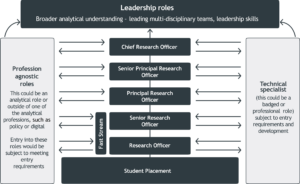Cookies on Civil Service Careers Site
We use some essential cookies to make this service work.
We’d like to set additional cookies so we can remember your settings, understand how people use the service and make improvements.
You’ve accepted additional cookies. You can change your cookie settings at any time.
You’ve rejected additional cookies. You can change your cookie settings at any time.


The Civil Service
- What is the Civil Service
- Working for the Civil Service
- Our Locations
- Civil Service Networks
What do Civil Servants say?
- Social Mobility in the National Security Community Catherine Holmes and Naomi Davey, co-NSC Social Mobility Champions, write about the National Security Community and their work to ensure the community represents the country.
- Julie's experience as an apprentice Hear from Julie Kanaan, a former Level 5 Coaching apprentice in the Driver and Vehicle Standards Agency (DVSA)
- Alison and Dave's life in HMRC Hear from Alison and Dave about what it's like to work within Customer Strategy & Tax Design in HMRC
Early Careers
- Apprenticeships
- Care Leavers Internship Scheme
- Civil Service Fast Stream
Experienced Hires
- Executive Leadership
- Contracting Opportunities
- Evidence House
- Civil Service Secondments
Supported Schemes
- Prison Leaver Recruitment
- Going Forward into Employment
Applying for a Job
- About the application process
- Civil Service Success Profiles
- How to write your CV
- How to write your Personal Statement
- Civil Service Behaviours
- Assessments and Interviews
- Guide to Job Sharing
Supporting your Application
- Great Place to Work for Veterans
- Disability Confident Scheme
- Reasonable Adjustments

Understanding the process
- Initial application stage
- Online tests
- Additional information
- Assessment Centre
- Final Selection Board
- Use of GenAI
- Fast Stream locations
- Starting on the Fast Stream
- Case studies

Government Social Research scheme

Scheme duration
Scheme overview.
On the Government Social Research (GSR) Fast Stream, you’ll work on the issues that really matter.
Government Social Research is the analytical profession that provides social and behavioural research and advice to the government. Our researchers enable the government to understand issues relating to society, groups and individuals; supporting policy debate and decision making through a variety of approaches, advice and evidence.
The benefits you’ll enjoy
The GSR Fast Stream offers a unique and fantastic opportunity to begin your career as a government social researcher. You will have the opportunity to work on issues that really matter, learn how government works, and gain the skills and experience that will allow you to be a future leader within the UK Civil Service.
In addition you will also have access to the benefits available to all UK civil servants, including the Civil Service Pension Scheme, professional qualifications, flexible working, season ticket loans, sports and social activities, childcare assistance and more.
What you’ll experience
As a Government Social Research Fast Streamer, you’ll contribute to the identification, investigation and reporting of social trends, the development of government policy, and the monitoring and evaluation of how policies make a difference to public services.
You will develop your social research skills, learning how social researchers operate in government, contributing to evidence-based decision making, evaluation, and consideration of the social dimension of differing policy areas and challenges.
Fast streamers are represented in all the main government departments, as well as the devolved administrations and other government bodies. On scheme, you will therefore undertake a broad range of tasks, building up your professional and leadership experience, and developing your skills as a social researcher. Your work might involve developing surveys, analysing data, producing statistics and reviewing existing research evidence. The work you do may also involve working with other analysts in government to provide timely, relevant and robust briefings for policy colleagues and ministers.
Promotion and successful completion of the scheme will see you earn between £45k and £55k. The scheme is designed so that, wherever you find yourself working in government beyond the Fast Stream scheme, you will have the skills and experience that allow you to be a professional leader within government, helping ensure that social research and analysis sit at the heart of the policy-making, monitoring and evaluation processes.
Entry requirements
- you need to be eligible to work in the UK
- you can apply through either one of the following routes:
1) Qualification route. You need, or expect to receive, a minimum of a 2:1 in your undergraduate degree, or a 2:2 with a postgraduate degree.
A qualifying degree is one which contains substantial social research methods training (comprising one third of modules taken in the course) including quantitative research methods and at least three of the following: systematic/literature reviews; qualitative methods; interpretation of data and presentation of results; study design and hypothesis testing; and application of ethics to research.
2) Experience route. You need, or expect to receive an undergraduate degree at a minimum of 2:1, or 2:2 with a postgraduate degree, in any subject, or a degree equivalent (e.g. an advanced Certificate or Diploma from MRS), plus have at least 4 years’ social research practice experience. Social research practice experience consists of experience working in a research agency, market research agency or specialist research team. You must make explicit the breadth and depth of your research experience and skills. Your experience must include quantitative research methods and three of the following: systematic/literature reviews; qualitative methods; interpretation of data and presentation of results; study design, hypothesis testing and application of ethics to research.
Demystifying the Government Social Research scheme
Supporting your learning
We want our GSR fast streamers to be the future leaders of the profession. Therefore, on scheme you will undertake a specific Learning and Development Curriculum to develop your leadership skills and wider understanding of the UK Civil Service.
In parallel you will also develop your professional social research skills and knowledge through on-the-job learning. You will also be able to access social research specific technical training, seminars and other courses, which can be tailored from our annual programmes to your specific learning needs.

Sim talks about his experience on the Government Social Research scheme, and why he chose this specific scheme.
“The amazing part about Social Research is the variety of roles on offer, using both qualitative and quantitative data to help inform decision-making. As social researchers in government, we are uniquely placed for our research to make an impact.”
Government Social Research fast streamer
Government Social Research fast streamer, Jamie
About the scheme.
GSR members come from a wide range of professional backgrounds and disciplines, covering the breadth of social and behavioural sciences. Our work puts people at the heart of government decision making by providing expertise and interventions to solve complex problems. GSR takes a scientific and tailored approach supported by bodies of knowledge and a range of research methods to inform, influence and provide robust and defensible decision-making at all levels.
We aim to deliver the best social science evidence for the government and we need highly skilled social and behavioural scientists to do that. You can read more about our strategy and commitment to diversity and inclusion in our strategies.
Scheme placement details
- Year 3 onwards
In your first year on the Fast Stream you will be allocated a department for your first posting. You’ll learn what is expected of a Government Social Researcher, learn essential research skills, and how social research is used to support the work of your home department. You will be expected to hit the ground running, contributing from the beginning to the work of the GSR in your home department. At the end of your posting you will undertake a short review to ensure that you are on track for scheme completion.
As you move to your second year posting, your responsibilities will increase. You will be able to take on a different role to begin broadening your experiences across government. You will also undertake another short review at the end of year two to ensure that you are on track for scheme completion.
You will move to a final post that will further broaden your experience and understanding of the application of social research across government, supporting your career development. After the usual end-of-posting review you will also undertake an assessment to ensure that you meet the requirements for scheme completion and to help you prepare for the next stage of your career.
Explore the schemes
Discover the stories.
Cookies on GOV.UK
We use some essential cookies to make this website work.
We’d like to set additional cookies to understand how you use GOV.UK, remember your settings and improve government services.
We also use cookies set by other sites to help us deliver content from their services.
You have accepted additional cookies. You can change your cookie settings at any time.
You have rejected additional cookies. You can change your cookie settings at any time.
GSR Research Officer Scheme
Join us as a Research Officer to launch a brilliant career in Government Social Research.
The GSR Research Officer Scheme in now closed for applications. Please register to be notified when it reopens in early 2025.
About Government Social Research ( GSR )
We are the professional body for social researchers in the Civil Service. Our social researchers study and analyse various aspects of society, like people’s behaviour, opinions, and needs. This then helps the government make informed decisions.
We recruit students, graduates, and apprentices to work in over 30 government departments across the UK, from the Ministry of Justice to the Office for National Statistics. With over 2,500 members working across government, you will be joining an established community of social research professionals, getting access to all the training, networking, and access opportunities that come with being part of a social research community that has a diverse array of experiences and professional knowledge.
What would I do as a Research Officer?
Government social researchers play a critical role in gathering, analysing, and interpreting the information which forms the foundation for decision making for policies which affect every UK resident.
As a Research Officer working in the Civil Service, you would contribute through analysis of social trends, development of government policy, and evaluation of how policies make a difference to public services.
Your work might involve developing surveys, analysing data, producing statistics, reviewing existing research evidence, and working with other analysts in government to provide timely and relevant briefings for policy colleagues and ministers.
Where would I work?
This year, we have opportunities available in the following locations: Birmingham, Bristol, Cardiff, Darlington, Edinburgh, Glasgow, Leeds, Liverpool, London, Manchester, Newcastle-upon-Tyne, Salford, Sheffield, Treforest (Pontypridd) and Wolverhampton.
How much would I get paid?
Salaries vary according to department and location, so please check the job descriptions for details. This is the minimum you would be paid: London: £34,410 / Nationwide: £31,120
What qualifications do I need?
Government Social Research ( GSR ) members come from a range of social science related backgrounds.
There are two entry routes into the GSR Research Officer Scheme:
- the Qualification Route
- the Experience Route.
Qualification Route Eligibility Criteria
You are eligible to apply for this route if you meet the following criteria:
- you have, or expect to achieve, a 2:2 or above in your undergraduate degree in a relevant social research subject (criteria for relevant subjects are outlined below); or a 2:2 in any subject with a postgraduate degree in a relevant social research subject
the qualifying social research degree must contain substantial social research methods training (comprising around one third of modules taken on the course) including quantitative research methods and at least three of the following:
- systematic/literature reviews;
- qualitative methods;
- interpretation of data and presentation of results;
- study design, hypothesis testing;
- application of ethics to research.
- you satisfy both the Civil Service Nationality and Right to work in the UK requirements as we do not offer sponsorship.
It your responsibility to demonstrate these criteria clearly on application. Please ensure you indicate the number of credits associated with the relevant modules covering your social research methods training as well as your degree’s total number of credits. We receive a high volume of applications for the scheme, so please ensure you are clear and concise in outlining the relevant modules for consideration.
Experience Route Eligibility Criteria
- you hold an undergraduate degree, at a minimum of 2:2 in any subject; and have at least 4 years social research practice experience
- your social research practice experience consists of experience working in a research agency, market research agency or specialist research team
- to apply via this route, you must make explicit the breadth and depth of your research experience and skills, which must include quantitative research methods and three of the following: systematic/literature reviews; qualitative methods; interpretation of data and presentation of results; study design, hypothesis testing and application of ethics to research.
It is your responsibility of the applicant to demonstrate these criteria clearly on your application form.
Why join the GSR Research Officer Scheme?
There are many benefits to working in the Civil Service. Here are just a few:
- Meaningful work that that makes a difference to society
- Opportunity to work in a wide range of govt departments
- Opportunities across the UK
- Flexible working
- 25 days annual leave (+8 public holidays)
- Competitive pension scheme
- Inclusive working environment
Join our Virtual Q&A Session
Our Q&A sessions for 2024 have now taken place. Download our Q&A session slides ( MS PowerPoint Presentation , 22.7 MB ) .
What happens after the first stage of the application process?
- Stage 2: Fill out the short application form.
- Stage 3: Sit two online tests (the Civil Service Verbal Test and the Civil Service Numerical Test).
- Stage 4: If you meet the minimum standard for both online tests, you will be invited to fill out the full application form. The form will ask you for information including details about your degree.
- Stage 5: Based on the performance of all applicants, a final pass mark will be set for the online tests. This may be higher than the minimum standard for both tests. [This is a process carried out by admin staff.]
- Stage 6: If you pass both online tests, you will be invited to sit the GSR knowledge test (offline). Full details of this test will be provided if you reach this stage.
- Stage 7: If you pass the GSR knowledge test your application will be sent on to sifters, who will consider whether you have demonstrated that your degree contains sufficient social research content. [This is a process carried out by staff.]
Stage 8: If you pass the sift, you will be invited to a virtual interview. The behaviours that you will be assessed against are:
- Managing a quality service
- Communicating and influence
- Working together
- Further information on what to expect at the interviews will be sent to candidates invited to attend.
What format will the interview take?
This will consist of a blended interview, which should take approximately an hour. It will include a 5-minute presentation with follow up questions to assess your technical skills as a social researcher, in line with the GSR Technical Framework at Research Officer level. At interview you will also be asked questions based on the following Civil Service Behaviours: Working Together, Managing a Quality Service, Communicating and Influencing.
The Civil Service Behaviours framework can be found here and further guidance on Success Profiles can be found on Civil Service Jobs here .
An example of a Behavioural question would be: “Tell me about a time when you’ve had to deal with a difficult customer.” It may help to use one or more examples of a piece of work you have completed or a situation you have been in, and use the STAR model to explain: Situation - the situation you had to deal with; Task - the task you were given to do; Action - the action you took; and Result - what happened as a result of your action and what you learned from the experience.
Nationality requirements
The Civil Service Nationality Rules are written into law, they are exempt from the Equality Act 2010 and must be followed. They outline who can and cannot work in the Civil Service.
In summary, from 1 January 2021 broadly the following groups will be able to work in non-reserved posts within the Civil Service:
- UK nationals
- Nationals of Commonwealth countries
- Nationals of the Republic of Ireland
- EEA nationals with (or eligible for) status under the EUSS
- Relevant EEA or Turkish nationals working in the Civil Service
- Relevant EEA or Turkish nationals who have built up the right to work in the Civil Service
- Certain family members of the relevant EU & Turkish nationals
A reserved post can be filled only by UK Nationals. A non-reserved post is open to nationals from the countries and associations of countries outlined above. These posts are non-reserved posts.
If you fail to follow these rules the appointment will be deemed illegal. Your employment will be terminated with immediate effect.
The Government Recruitment Service (GRS) checks candidates against the nationality rules as part of the pre-employment checks.
Right to work: immigration requirements
You must have the right to work in the United Kingdom and meet the Immigration and Visa requirements for the scheme.
Further details can be found on the Gov.uk Visas and Immigration page
Before the appointment of the successful candidate can be confirmed, the employing department will undertake background security checks. As part of these, we will need to confirm your identity, course details over the past three years (or employment details if you were in employment), nationality and immigration status, and criminal record (unspent convictions only).
All employees must meet the Baseline Personnel Security Standard ( BPSS ). This is a series of basic security checks to confirm identity, right to work in the UK, employment history and, where relevant, details of any criminal record. Successful candidates must meet the security requirements before they can be appointed.
Additionally, some roles within the government will require you to successfully complete National Security Vetting at Counter Terrorism ( CTC ), Security Clearance ( SC ), or Developed Vetting ( DV ) level as a condition of appointment.
To meet CTC , SC or DV requirements, you will normally need to have been resident in the UK for at least 3, 5 or 10 years prior to the date of application (the level of checks that are required are stated in the advert; more information on the levels can be found here ). If you do not satisfy the residency criteria, an application may be submitted and a decision will be made on a case by case basis; consideration will be given to where you lived, how long you were out of the UK and why you were abroad.
If you are applying for a role requiring security clearance, please be aware that foreign or dual nationality is not an automatic bar. However, certain posts may have restrictions which could affect those who do not have sole British nationality or who have personal connections with certain countries outside the UK.
All offers of employment are conditional on successful completion of BPSS and National Security Vetting. Candidates should not resign from their current job until these checks have been successfully completed.
Allocation to a gsr department.
You will be assigned to a department for your first posting within the GSR , with an expectation of staying in this department for two years.
We will take into consideration candidates’ preferences on location, but may not be able to fulfil these preferences on all occasions. It is worth noting that any role in the Civil Service will be a rewarding opportunity.
The Civil Service is committed to becoming the most inclusive employer in the UK.
We are committed to understanding, respecting and representing as broad a range of views and backgrounds as we have in UK society. We know that diverse perspectives and experiences are critical to an effective, modern Civil Service. Our vision is to ensure the Civil Service represents modern Britain and is a truly inclusive employer - an example to other employers. We will create an organisation where diversity is not only respected and valued - but celebrated.

What is in it for me?
We want to maximise the potential of everyone who chooses to work for us - regardless of background. If you are interested in developing your career with us – starting with this interesting and challenging role – or doing things differently and inspiring colleagues, then the Civil Service is the place for you. Our passion for diversity and equality means creating a work environment for all employees that is welcoming, respectful, engaging, and enriched with opportunities for personal and professional development.
What is next?
You’ve taken the first step and looked through this page to understand the skills and experience needed to perform this role. Now join us in achieving our ambitions and let us help you achieve yours. Civil Service Diversity and Inclusion Strategy: 2022 to 2025 .
Under the terms of the Equality Act 2010, we will always consider making reasonable adjustments to ensure that disabled people are not disadvantaged in the recruitment and selection process. We are therefore committed to meeting, wherever possible, any needs you specify in your application. We will also consider any reasonable adjustments under the terms of the Act to enable any applicant with a disability (as defined under the Act) to meet the requirements of the post.
How to apply
Details on how to apply for the 2025 scheme will be published here in spring 2025.
Resources for applicants
- For more information about the recruitment process, see the - Candidate Guide - GSR Research Officer 2024 ( MS PowerPoint Presentation , 305 KB )
- For more information about the kinds role you could be working in as a social researcher, see the - Job Descriptions - GSR Research Officer 2024 ( ODT , 177 KB )
Social media
Please follow our social media accounts to keep up to date with relevant information.
X / Twitter LinkedIn Instagram Facebook
Complaints procedure
Complaints must be submitted in writing or email and addressed to:
Head of GESR Recruitment, GESR Team, Room 1/15, HM Treasury, 1 Horse Guards Road London SW1A 2HQ
Please provide the fullest account possible of the circumstances surrounding your complaint.
If you do not submit your complaint within a year after the campaign took place, we will not be obliged to consider it.
Our commitment to you
- We will aim to acknowledge your complaint within three working days of its receipt
- We will take your complaint seriously, give it high priority and investigate it fully and impartially
- We will aim to send you a full written response to your complaint within 20 working days of its receipt. If this is not possible, we will let you know, and explain why
- If your complaint is upheld, we shall take action to ensure that the event complained does not recur
- If your complaint is not upheld, we will advise you of options for pursuing it further, should you wish to do so
Working for the Civil Service
The Civil Service code sets out the standards of behaviour expected of civil servants.
The GSR Code is an addendum to the Civil Service code. The purpose of the GSR Code is to set out the GSR ’s additional professional standards of behaviour.
We recruit by merit on the basis of fair and open competition, as outlined in the Civil Service Commission’s recruitment principles. The Civil Service embraces diversity and promotes equality of opportunity. There is a guaranteed interview scheme ( GIS ) for candidates with disabilities who meet the minimum selection criteria.
Updates to this page
Our GSR Research Officer Scheme closed for applications on the 18 March 2024. It will reopen in spring 2025.
Q&A session slides have been added.
The GSR Research Officer Scheme is now open for applications.
The scheme is closed and information on when it opens in February 2024 has been added
Link to Civil Service Jobs posting added. Application closing date updated. Candidate guide and example job descriptions added.
Q&A Session information added.
Application dates changed for the 2023 GSR Mainstream Campaign.
Updated - Scheme now open
Update on 2022 scheme dates
Candidate pack and job description uploaded
Candidate pack and job description have been uploaded
First published.
Sign up for emails or print this page
Related content, is this page useful.
- Yes this page is useful
- No this page is not useful
Help us improve GOV.UK
Don’t include personal or financial information like your National Insurance number or credit card details.
To help us improve GOV.UK, we’d like to know more about your visit today. Please fill in this survey (opens in a new tab) .
- Guidance hub
Role profile: social researcher
Social researchers use the methods of social scientific enquiry to measure, describe, explain and predict social and economic phenomena to policy makers. These methods include:
- controlled trials
- qualitative research
- case studies
- analysis of administrative and statistical data
Researchers:
- provide government with objective, reliable, relevant and timely social research
- support the development, implementation, review and evaluation of policy and delivery
- ensure policy debate is informed by the best research evidence and thinking from the social science
- provide in-depth data and objective analysis on what people and organisations think – this includes analysis of how they behave and why they may not be responding to initiatives
- ensure government and decision-makers have an understanding of the people and organisations affected by their decisions – this includes thinking about the wider social consequences
You can find more information about Government Social Research (GSR) roles and skills in the GSR Technical Framework . The Framework which was fully rebranded in February 2022. It gives details about the technical expertise for members of the GSR profession at each grade.
The Framework concentrates on understanding people and society, which is the main purpose of GSR. It covers GSR Technical Expertise, which falls into two categories:
- technical skills
- using and promoting social research
These categories cover the skills and knowledge needed for social research within government. The technical expertise indicators are cumulative. This means that GSR members at each grade should be able to demonstrate the expertise for their grade and the grades below them.
Members of the GSR can also use the new GSR Professional Skills Framework on the GSR members website . The Professional Skills Framework gives details about the range of professional skills that GSR members across government need to help their career and development aspirations.
Typical role responsibilities
The role responsibilities for social researchers are different depending on the level of the role.
Research Officer
At this level you will:
- have good knowledge of research methodology, method, and the latest techniques – for example, at degree level 2:1 or 1st
- be able to apply research methodology, method, and the latest techniques in small scale research projects
- be able to design small scale and less complex research projects – this includes defining research questions and writing draft specifications
- be able to summarise and interpret information accurately – this includes using different sources, analysing important data sets, and using your knowledge of relevant data analysis packages
- have a good working knowledge of departmental procurement procedures, quality assurance processes, legal and ethical issues and principles relating to social research
- be able to critically assess and evaluate information and evidence to support team members managing more complex external research projects – such as judging merits of research tenders, assessing research findings, or evaluating new ideas and methodologies
- persuade other people to support the research process – this includes working to increase awareness of cross cutting research possibilities
- understand policy context to produce appropriate and timely analysis, and clear reporting of research results, tailored to customer needs.
Senior Research Officer
- be able to demonstrate a thorough knowledge of research methodology, method, and the latest techniques including main quantitative, qualitative and evaluation methods – you will be at post graduate level, with at least two years of applied experience
- be up to date with methodological developments
- have experience of designing medium scale or more complex projects – this includes applying best practice guidance, identifying new areas for work, and translating policy requirements into comprehensive specifications that will meet customer needs
- be able to accurately evaluate competing data sources – this involves being able to identify important points and trends to produce logical, accurate conclusions
- have experience of managing research projects of significant scale – this involves working with other analysts and following relevant legal, ethical, procurement, and quality assurance practice to ensure quality of results and methodological thoroughness
- be able to clearly communicate analysis of complex information – this will help other people make good use of social research evidence, even if it is not perfect
- be able to encourage other people to have an interest in social research
- about to contribute effectively to internal and external research projects
- understand policy context and timescales – this involves being able to explain different perspectives critically and analytically
- be able to work with other analysts to meet customer needs
Principal Research Officer
- have at least four years of experience in designing, working on and managing social research – this also involves providing research based advice and briefings
- be able to apply your understanding of user needs and ability to identify research needs and evidence gaps – this includes being able to produce effective research designs to meet user needs
- be able to evaluate and integrate research information from a variety of sources to reach logical conclusions – this also involves being able to effectively communicate this information to senior non-specialists, and helping them to take notice of important findings and implications
- have extensive experience of commissioning and managing research
- be able to develop research coordination strategy and understand how other analytical professions contribute to the strategy
- be able to communicate your understanding of policy realities while clearly and accurately presenting social research evidence – this includes ensuring appropriate social research input to policy decisions
- be able to work with other analysts within and outside government, and across departments to achieve comprehensive, relevant input that is of a high quality
- be an advocate for social research – this includes educating other people about social research, which will help to develop customer expectations and needs
- keep up to date with new methodological developments – this includes being aware of how they might be used within departments and in different policy contexts
Senior Principal Research Officer
- be able to apply your knowledge to high profile and complex projects – this includes providing a supervisory role for team leaders where appropriate
- work to improve identification of research need and ability of research work to meet this through effective challenge and promotion of innovative methods and techniques.
- actively explore different perspectives when evaluating data – this involves communicating with lots of different colleagues to inform this process
- use your experience in research formulation at the overall programme level
- make timely and objective decisions, based on best available evidence and comprehensive analysis – this will help other people to make accurate inferences from the available information
- encourage staff to think about using new and innovative methods in social research and evaluation
- advocate for the use of social research at the strategic level – this involves developing research strategies, actively exploring different options, and identifying shared interests
- ensure programmes of work are closely aligned with strategic objectives given by customers
Chief Research Officer
- ensure high standards for social research – this involves keeping up to date with methodological developments and identifying value to your department and across Whitehall
- anticipate future needs based on your understanding of evidence base
- give advice based on critical evaluation of wide range of research
- communicate relevant findings from complex research programmes to senior people and influential audiences in an engaging and accurate way – this gives politically aware advice to stakeholders that informs policy and practice
- set a learning culture for all staff by instilling professional integrity and high professional standards in line with the GSR code – this involves encouraging breadth and depth in research skills including innovative methodologies and techniques, and good understanding of other analytical disciplines
- demonstrate excellent cross functional awareness and use different analytical disciplines to produce comprehensive solutions
- work with senior analysts and policy colleagues to develop a coherent and integrated research vision that reflects the contribution of each analytical discipline and meets customer needs
- encourage excellence in social research practices and application
- create intelligent customers and build your customer base
- create and maintain influential relationships with the senior colleagues and important stakeholders outside government
- present a compelling case for the value of social research
- understand your evidence base, policy area and customers’ priorities to influence research priorities
- ensures policy and political implications of research are understood and managed
- develop policy and action plans with customers – this includes ensuring research capability and evidence base is relevant to the short term goals and strategic priorities of your main customers
Sample career path
The social researcher career path shows some of the common entry and exit points for the role. It also shows the typical skill levels needed.
You can enter a social researcher role from another analytical profession, or from other professions. You can also exit the role to join another profession.

The diagram shows a potential career path. It shows that you can enter or leave a role from a wide range of backgrounds and experience levels. For example, you could become a social researcher by developing your skills on a student placement. You could continue to move up the levels in the career path by taking on more senior social researcher roles. Or you could develop your skills by working in a technical specialist role in an analytical or digital profession. You could also develop the necessary skills by working in a profession agnostic role outside of these professions.
What we mean by 'profession agnostic'
A role that could be done by any person with the relevant skills or experience from any profession.
What we mean by 'technical specialist'
This could be a ‘badged’ or professional role that is subject to entry requirements and development.
Beyond the chief social officer role, you could go into more senior leadership roles. These roles require broader analytical understanding, and the ability to lead multi-disciplinary teams.
This site requires JavaScript for certain functions and interactions to work. Please turn on JavaScript for the best possible experience.
Register for our newsletter

What is social research and why does it matter? Head of profession Jenny Dibden explains all

By Tevye Markson
25 Jul 2023
First things first, what is the Government Social Research profession and why is it important?
The GSR is a group of around 2,500 social-science professionals who provide evidence-based research and analysis to support policy development, implementation and evaluation. We work in a variety of departments and are responsible for ensuring that government policy can draw on robust evidence. We also evaluate the effectiveness of policies once they have been implemented. The GSR profession covers a wide range of disciplines – such as sociology, behavioural science, psychology, criminology and geography – and we use surveys, experiments and qualitative research to collect and analyse data. We write advice for ministers based on our work.
How has the role and perception of social scientists changed in the civil service since you first joined?
The contribution that social science can make to good policymaking and delivery is now understood by more people in government. The growth in understanding has been happening over a long period but Covid-19 put a particular focus on the contribution that science could make, including the social and behavioural sciences.
What kind of work do social researchers in government do?
It spans from gathering data and evidence to inform policy decisions, through to designing and conducting surveys, focus groups and interviews, to analysing large administrative datasets or national surveys. It also involves working closely with policy and delivery colleagues to ensure policies and programmes are robustly evaluated and evidence is fed back into decision making.
Can you tell us about a time when you were especially aware of the impact that GSR can have on policies or outcomes?
During my time in the Department for Work and Pensions and its predecessor organisations, there was a debate about whether or not lone parents wanted to work. Researchers in the Department of Social Security had already collected evidence that showed lone parents did indeed want to, but faced barriers that needed to be addressed.
Since becoming head of GSR you’ve moved jobs and departments several times – what has made you want to stay in the head of profession role?
Why would I not want to? Social and behavioural science has a lot to offer government and I want to continue to play a role in that. In recent years I have moved into policy and delivery, but can still make a contribution to GSR by being part of the leadership team of both GSR and the analysis function, and as a customer for analytical work.
You also have a role at the Department for Levelling Up, Housing and Communities. What does that involve, and how does it slot in with your GSR work?
I am currently in a non-GSR job as director of community investment and funding services in DLUHC. My team delivers a number of funding programmes, such as the Community Ownership Fund and the European Regional Development Fund. The two roles are complementary. I commission and consider evidence as part of my DLUHC job, at the same time as making sure government has access to the high-quality social research capacity and capability it needs, whether from internal or external sources.
How did the creation of the analysis function change the social research profession and your role as head of the profession?
It brought a greater emphasis on collaboration and coordination, as well as knowledge and expertise exchange. This has led to a greater appreciation of the complementary skills and methods across the analytical professions and contributed to breaking down silos. It also sharpened our focus on ensuring that analytical work was aligned with the strategic priorities of government within the broader policy landscape.
Do you think social research is well understood by the wider civil service?
It’s quite technical and methodologically oriented, so it can sometimes be difficult for non-social researchers to fully understand research findings. However, there have been significant efforts over many years to ensure social researchers are equipped with the communication skills needed to convey policy recommendations and the importance of social research in decision making.
How can colleagues in other professions work most effectively with your profession?
There is already a lot of effective working between professions. GSR is part of the analysis function and we also work closely with the chief scientific adviser network, and the policy and operational delivery professions.
It’s important to involve social researchers in the policymaking process as early as possible, so research, data collection measures and evaluation plans are integrated in policy development. It helps if colleagues in other professions can be as clear as possible about their needs and priorities.
This will ensure social researchers can be most effective in defining research questions, required data and appropriate methodology.
The GSR profession published a strategy in 2021 which set out three aims, including to be more impactful and influential. How are you seeking to achieve that?
Robust social research evidence and advice should be at the heart of decision making. This will be achieved through four priorities. Firstly, creating a solid and comprehensive network of stakeholders, both internally and externally, to ensure that social research is understood and championed.
Second, collaborating with policy and delivery colleagues at all stages so that social research is at the forefront of policymaking.
Third, investing in the quality and accessibility of research to ensure it is reliable, robust and clearly communicated.
And finally, improving the generation and use of diversity and inclusion data to fully represent the society we serve.
In the strategy, the profession sets out the main challenges facing the UK as recovery from Covid-19, the need for rapid decarbonisation, and the imperative to level up across the UK. Can you give us any examples of how GSR has been supporting the response to one or two of these areas and had an impact?
GSR has been, and continues to be, instrumental in those three areas – supporting rapid government responses and the development of effective policies. To give you just a couple of examples, during Covid-19, GSR members helped ministers understand the impact of the pandemic on different communities and evaluated government interventions.
And for decarbonisation, social researchers have gathered and analysed data about public attitudes towards climate change, and have contributed to the development of evidence-based policies to support the transition to a more sustainable economy.
"Robust social research evidence and advice should be at the heart of decision making"
The strategy also talks about anticipating future areas that would benefit from GSR input. How are you going about that, and what do you think will be the priority areas in the coming years?
We constantly monitor academic literature, policy documents and news reports to identify emerging trends, opportunities and challenges. We also devote great attention to the dialogue with policymakers, practitioners and experts from different disciplines and professions to gather information about concerns and needs.
In terms of future priorities, we expect to keep focusing on reducing socio-economic inequalities and increasing social mobility, understanding and managing the impact of technology, AI and automation on society, and addressing climate change and the challenges it poses.
Another priority in the strategy was to improve diversity and inclusion in the GSR. What progress has the profession made, and what are the biggest hurdles?
GSR has introduced changes to eligibility criteria. It used to be that candidates entering GSR through the main stream needed a 2:1 degree in a relevant degree subject. After analysing the experiences of those with protected characteristics and lower socio-economic backgrounds, we opened the profession to those with 2:2 degrees.
Our recruitment process is assessed for equality impact, to enable fair access and an enhanced recruitment experience for all candidates. And through our partnership with Change 100 – a programme of paid summer work placements and mentoring for disabled students and recent graduates – interns are being placed within departments, working with the GSR.
One of the largest hurdles remains the need to ensure the GSR community fully represents the society it serves across all grades, so we will be analysing our internal data to identify trends throughout our recruitment campaigns, to ensure that we know where we lose those that are disproportionally under-represented through recruitment processes.
Finally, what does it take to be a good social researcher?
You need a passion for improving people’s lives. You should be intellectually curious and devoted to understanding the causes of things and the “invisible” aspects of our lives, such as feelings, attitudes and beliefs. And you’ll need a comprehensive knowledge and experience in social research methods.

Read the most recent articles written by Tevye Markson - Sue Gray to get life peerage


IMAGES
COMMENTS
Government Social Research (GSR) is the analytical profession within Government for Civil Servants who generate and provide social and behavioural research and advice. ... As well as on-the-job learning and generating a wider understanding of the UK Civil Service, all Government Social Researchers have access to a wide range of social research ...
The Government Social Research profession supports the development, implementation, review and evaluation of government policy. Government Social Research Profession is part of the Civil Service .
Government Social Research (GSR) is the analytical profession within Government for Civil Servants who generate and provide social and behavioural research and advice. The GSR is committed to becoming a community of greater diversity and inclusion, and to the core values of the Civil Service: integrity, honesty, objectivity and impartiality.
Discover the Government Social Research (GSR) Fast Stream scheme. Over 3.5 years you'll work on the issues that really matter. ... and gain the skills and experience that will allow you to be a future leader within the UK Civil Service. In addition you will also have access to the benefits available to all UK civil servants, including the Civil ...
We are the professional body for social researchers in the Civil Service. Our Social Researchers study and analyse various aspects of society, like people's behaviour, opinions, and needs.
About Government Social Research (GSR) We are the professional body for social researchers in the Civil Service. Our social researchers study and analyse various aspects of society, like people ...
Government Social Research (GSR) is the analytical profession for civil servants who generate and provide social and behavioural research and advice. GSR members enable government to understand issues relating to society, groups and individuals. They also support policy debate and decision-making through a variety of approaches, advice and ...
be an advocate for social research - this includes educating other people about social research, which will help to develop customer expectations and needs; keep up to date with new methodological developments - this includes being aware of how they might be used within departments and in different policy contexts; Senior Principal Research ...
Robust social research evidence and advice should be at the heart of decision making. This will be achieved through four priorities. Firstly, creating a solid and comprehensive network of stakeholders, both internally and externally, to ensure that social research is understood and championed.
Government Social Research (GSR) is the analytical profession within Government for Civil Servants who generate and provide social and behavioural research and advice. GSR members enable government to understand issues relating to society, groups and individuals; and support policy debate and decision-making through a variety of